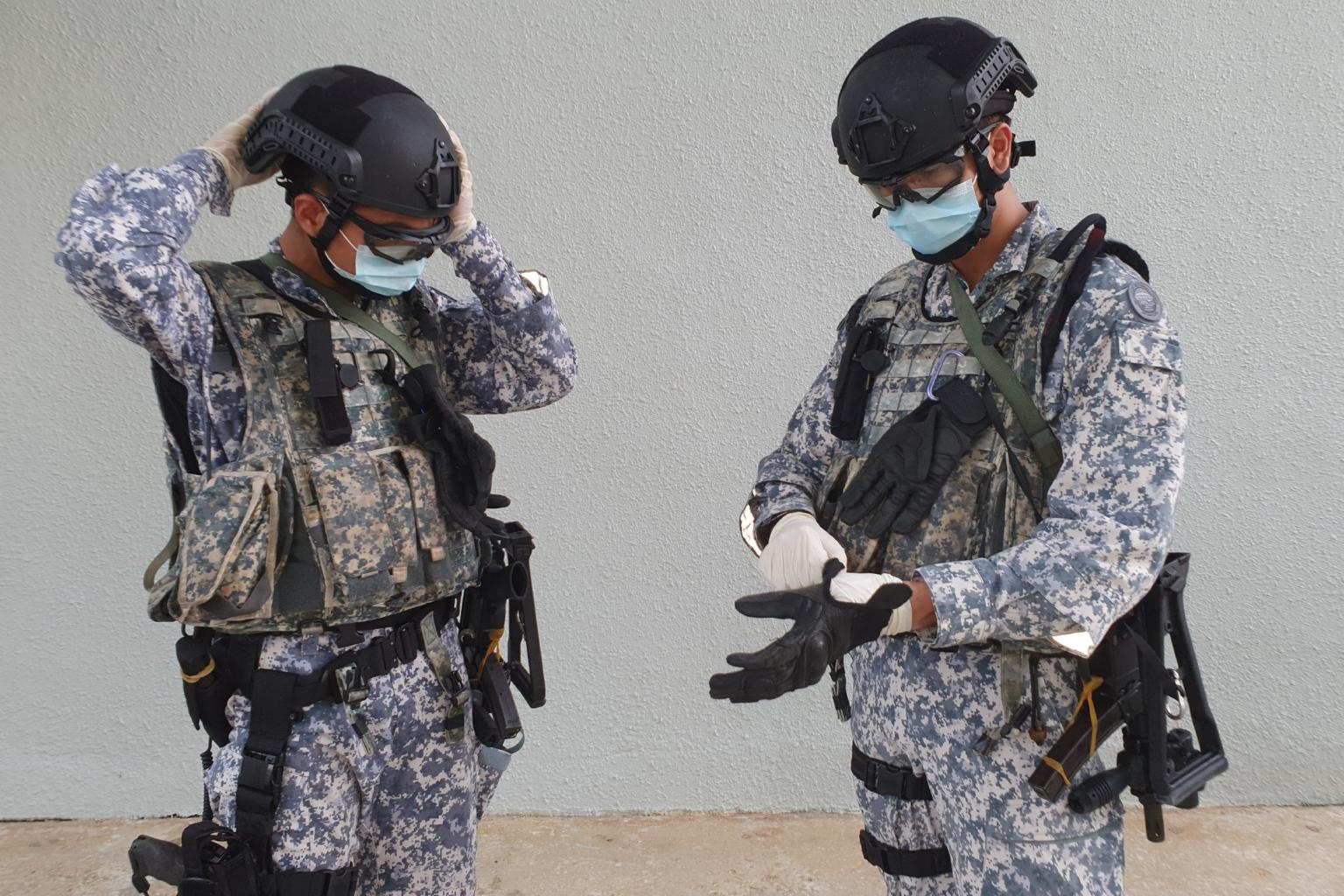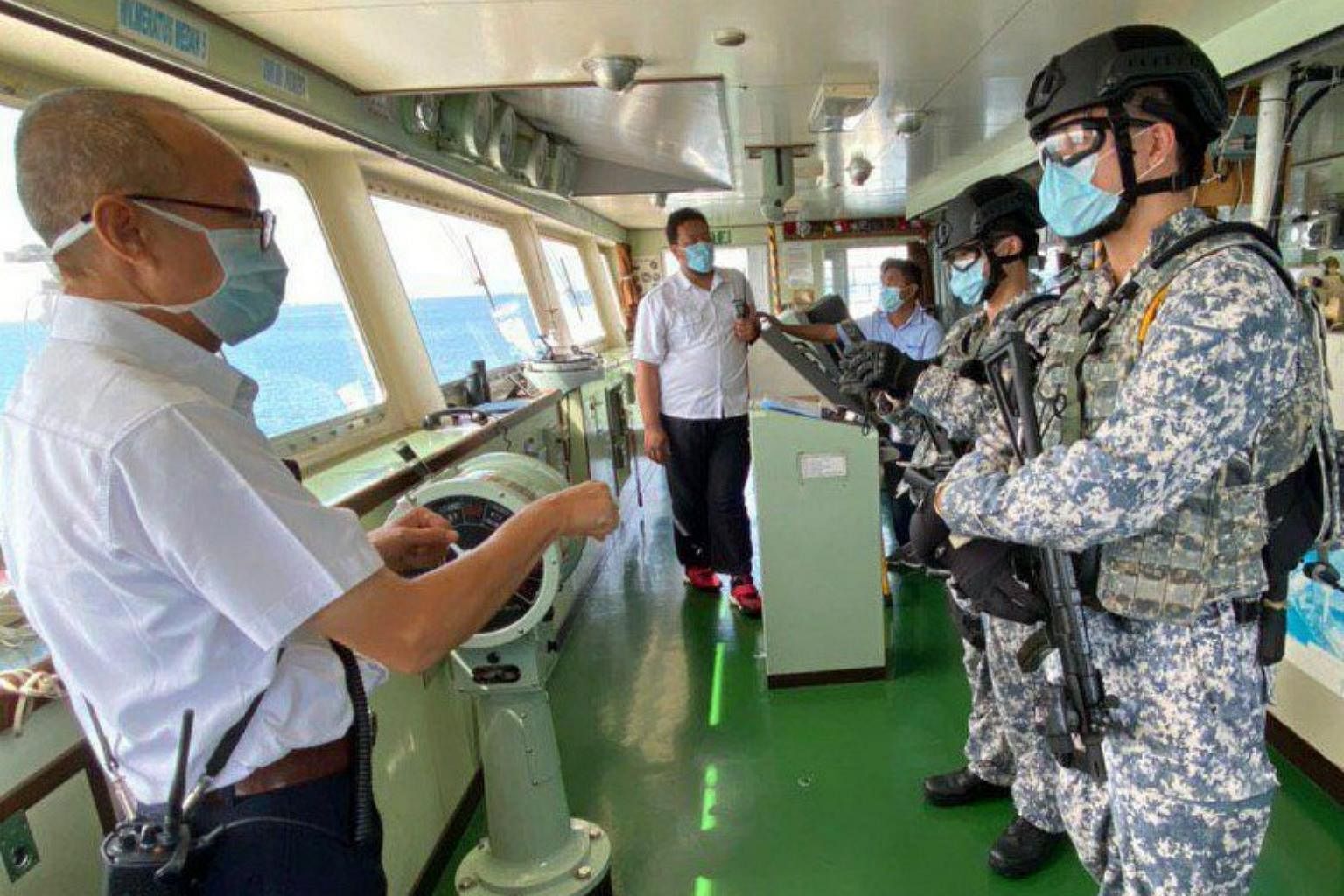Singapore navy's boarding teams ensure safe passage of essential goods via the sea amid Covid-19 restrictions
Sign up now: Get ST's newsletters delivered to your inbox

Accompanying sea security team operator Private Nigel Lim (left) and his team member ensure that their personal protective equipment are put on properly before operations begin.
PHOTO: MINDEF
Follow topic:
SINGAPORE - The Covid-19 pandemic might have resulted in travel restrictions, but essential goods including food continue to come into Singapore, mostly via the sea.
Helping to ensure the safe passage of these merchant vessels is the task of 180 Squadron from the Republic of Singapore Navy (RSN), which boards ships as part of operations every day to check for stowaways, suspicious goods and activities.
Sailors from these boarding teams, affectionately known as sea marshals, now have to don protective gear, such as masks, goggles, and latex gloves, as part of precautionary measures against the coronavirus. They also adhere to safe distancing measures and have to speak louder or use hand gestures more often to communicate with ship crew as the masks muffle their voices.
The operations of these accompanying sea security teams continue as a critical operations unit of the Singapore Armed Forces, in order to deter bad actors such as terrorists and pirates.
The operations of these accompanying sea security teams continue as a critical operations unit of the Singapore Armed Forces, in order to deter bad actors such as terrorists and pirates.
The squadron's commanding officer, Major Brandon Choo, said on Monday (May 18) that even during the pandemic, maritime trade continues to be very active, with 70 per cent of the world's maritime trade transiting through the Singapore Strait.
"This is even more so because many countries have stopped trade via air, as many planes are grounded," he told reporters in a virtual interview, adding that many food imports come via the sea.
The squadron, formed in 2004 under the Maritime Security Task Force, are on standby 24 hours a day, and can conduct two to three boarding operations daily, based on indicators like voyage information, crew manifest and security records.
According to the Maritime and Port Authority of Singapore, there are about 1,000 vessels in the Singapore port at any one time, and a ship leaves or enters the country every two to three minutes.
The number of operations they conduct has remained about the same during this period, said Maj Choo, 38. The servicemen on duty have to be isolated in base before and during their duty for weeks at a time to reduce the risk of infection.

To motivate the crew during their shifts, he said the unit's leaders buy food from outside the base, such as fast food or local delicacies like tau huay, or soya beancurd, as "care packages" for the men.
"The morale of the operators in the squadron remains high, as each individual is engaged in very meaningful work. They know that they contribute directly to Singapore's security," he added.
While safe distancing has to be observed on board the harbour launches that take the boarding crew members to sea, this has not affected the number of personnel that are deployed on operations, said Maj Choo.
Private Nigel Lim, 22, a full-time national serviceman from the squadron, said apart from having to speak louder and using hand gestures more often in communicating with the crew of ships they board, the extra personal protective equipment they now have to wear does not affect their movement.
After every operation, they have to follow a designated route so they do not interact with members of other teams. They go straight to their lodging area to sanitise their equipment, as well as take a shower.
"I feel (the work we do) is very important to the safety of our sea line. By performing these operations daily, we make sure that necessities reach Singapore safely," he said.

